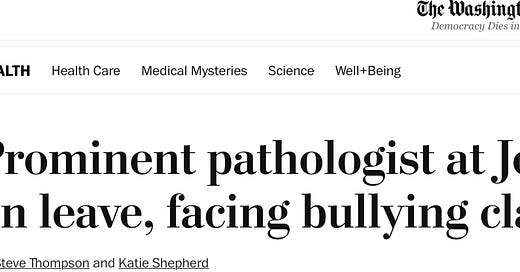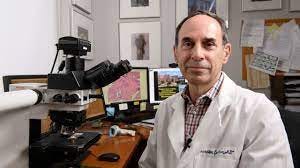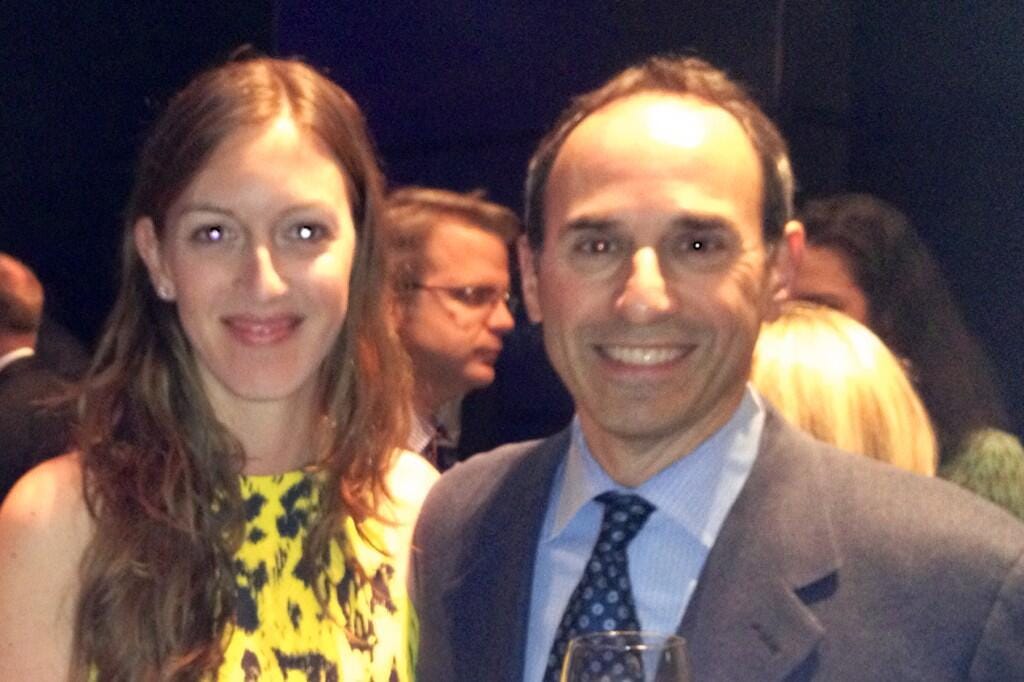Just in: Famed Hopkins' pathologist Dr. Jonathan Epstein on leave amidst charges of a "culture of bullying" to aid his pathologist-wife
By Howard Wolinsky
In May, TheActiveSurveillor broke the news that go-to prostate pathology guru Jonathan Epstein, of John Hopkins, was on administrative leave, but the reasons were not revealed—though the prostate gossip mill was grinding out rumors.
Epstein, who read more than 12,000 cases per year as pathology’s top gun and changed the face of Gleason diagnoses, did not respond to emails in May. Sources said the reasons would eventually be disclosed even as they observed Dr. Epstein’s absence at major events, including a memorial service for Hopkins’ urology chair.
Now, the Washington Post is revealing Epstein has been charged with bullying and intimidating other doctors to agree with findings from his wife and fellow pathologist Hillary Ross Epstein, MD. Also, the Post quoted sources who said Epstein himself gave second opinions that agreed with diagnoses made by his wife.
The Post asked Epstein whether giving second opinions on his wife’s reports was a conflict of interest to which he responded “based solely on my objective evaluation of the case.” The Post was unable to reach Hillary Epstein.
Arthur Caplan, a professor of bioethics at New York University’s Grossman School of Medicine, said it is a gray area whether a physician should get a second opinion from a spouse.
(Drs. Epstein in a wedding photo at Big Sur.)
(Pathologist-appropriate romantic decoration from the Epstein wedding.)
Who knows what this controversy means for the scads of us who have had second opinions from Jonathan Epstein and taken his readings as gospel? Likely, we’re fine though if cases involved the spouse you might have them scrutinzed.
Dr. Epstein told The Post in an email: “Of the 12,000 cases sent to me for my opinion each year from patients, urologists, and pathologists in the United States and overseas, my one goal has been to give patients the most accurate diagnosis possible.”
Epstein is on administrative leave “after a misdiagnosis led to a patient’s bladder removal, and as allegations have surfaced that he bullied or intimidated others in his department, “ the Post said.
Epstein, 66, is a subscriber to TheActiveSurveillor.com and has tipped me on several scoops.
(I have asked him to provide further comment. I’d like to hear more of his side of the story.)
He told the Post that the reviewers from the Joint Commission did not contact him.
The Post said Epstein was accused of “bullying” and “intimidating” by other pathologists and residents, pressuring them to provide second opinions that agreed with those of his pathologist wife Hillary Epstein, MD, 44, of Chesapeake Urology Associates in Beltsville, Maryland.
They have been married since 2014. She completed the Hopkins program in 2013.
The newspaper, which spoke on an anonymous basis to four people familiar with the situation, said: “And in one such case, a man underwent a radical procedure to remove his bladder, only to have a post-surgery analysis indicate a different diagnosis, according to the interviews and a report by the Joint Commission, a private, nonprofit organization that accredits hospitals. The report directed the Baltimore hospital to address long-standing concerns among physicians and others ‘regarding a culture of bullying and intimidation in the surgical pathology department,’ which it said had left patients vulnerable to improper care.”
Epstein, the hospital’s director of surgical pathology, said in written comments to The Post that he was “profoundly distressed” by the allegations in the report, “as they are the antithesis of everything I stand for and have tried to exhibit in my professional life over these 35 years at Johns Hopkins.” He said that patient privacy considerations prevent him from discussing the bladder removal case but that, in general, medical cases “have many complicating factors.”
The Joint Commission report says reviewers received “multiple comments by pathology physicians and residents stating they did not feel comfortable speaking up regarding ‘intimidation’ or ‘bullying’ behavior by a department leader, indicating that they were forced to change diagnoses, issue addendums and defer to the leader’s wishes over several years, thereby potentially leading to harm to patients.”
Physicians said “they feared retaliation or career repercussions if they spoke up,” according to the report, which was based on interviews with physicians, residents, hospital leaders, chief medical officers, and others. The report did not provide specific details about the behavior characterized as bullying.
The hospital declined to provide its own findings, citing patient confidentiality.
Epstein, 66, who confirmed that he has been on paid administrative leave since late May “pending evaluation of my responses to allegations,” said he was not interviewed by Joint Commission surveyors or given an opportunity to provide his viewpoint for the report.
“I have always complied with professional responsibilities, and treated all staff, students, trainees, patients, faculty and health care professionals with respect, civility, and fairness,” Epstein said in written comments. “When in a supervisory role, I have tried to resolve differences and counsel colleagues and subordinates in a constructive and private manner.”
Epstein has been an internationally recognized pathology in pathology for decades.
He was famous for speaking directly with patients to discuss his findings, contrary to the practice of many pathologists who consider themselves “the doctor’s doctor,” not the “patient’s doctor.”
Epstein helped redefine the Gleason system to name Gleason 6 as Grade Group 1 because patients were disturbed at the rating, thinking that they were half in the grave when it really was a low grade. He also has led the opposition of renaming Gleason 6/Grade Group 1 as a “noncancer” because he fears patients would abandon surveillance.
In the 1990s, he did the foundational work that led to the classification of very low-risk prostate cancer vs. low-risk. The National Comprehensive Cancer Network still uses this classification, while the American Urological Association dropped it last year. For more on this debate: https://www.medpagetoday.com/special-reports/apatientsjourney/104586
He has spearheaded reforms of the Gleason scoring system. Most recently, he created the Grade Group system in which patients at the lowest risk are classified as Grade Group 1. Previously, such patients were classified as Gleason 3+3=6, which concerned some patients who misinterpreted a “Gleason 6” as being aggressive cancer based on the relatively high number. Epstein came up with the idea of changing the scale to put patients’ minds at ease.
Epstein also has challenged the proposal to rename Gleason 6 lesions as non-cancers out of concern that patients won’t continue surveillance if they are told they have a noncancer. See: https://ascopubs.org/doi/full/10.1200/JCO.22.00926
Epstein has been generous with his time in speaking to patient groups. Most recently, he appeared in the Active Surveillance 101 program on second opinions and biopsies: https://aspatients.org/a-s-101/ He also appeared in a Q&A in April: https://aspatients.org/meeting/as-101-episode-5-second-opinions-and-biopsies/
He also spoke to AnCan: https://ancan.org/webinar-active-surveillance-and-beyond-4-dr-jonathan-epstein-grading-prostate-cancer-for-as/
In 2003, Epstein released a pathology report as then-Senator John F. Kerry (D-Mass.) vied for the Democratic presidential nomination, noting that an examination of tissues near the candidate’s prostate showed that a cancer there had not spread.
I know patients who have continued to use and are satisfied the Hopkin’s second opinion program sans Epstein: https://pathology.jhu.edu/patient-care/second-opinions/send
Looks like they just removed Dr. Epstein’s photo from the website.
(I was a bit non-plussed when a Gleason 6 patient told me the Hopkins’ administrator urged him “not to read about Gleason 6.” Why not?)
I also suggest patients use the second opinion program at Tufts Medical Center. Contact Dr. Ming Zhou: Ming.Zhou@tuftsmedicine.org
Meanwhile, vote, OK?
By Howard Wolinsky
Can you weigh in on my survey on what otherwise healthy men should do about Active Surveillance once they reach their mid-70s?
I have had 90 responses, but I’m greedy and would like more by the time I close voting on next Friday.
There’s still time to answer a couple of questions on AS and related topics: https://forms.gle/oFvfH3rPdgJmEbiQ7
Can we can get a dialogue going with the urologists and develop guidelines to help us decide what to do about AS in older men?
See more:
The old man and AS
By Howard Wolinsky I mentioned in this space the other day that my prostate signs point to stability and most likely I’ll die from something else. In a way, I am lucky. I have learned to co-exist with my “cancer” on Active Surveillance (AS) without overwhelming emotional distress. Mine has not been an Anxious Surveillance.
You’ve got questions? They’ve got answers.
By Howard Wolinsky
Starting in November, a panel of experts will answer your questions about Active Surveillance and lower-risk prostate cancer right here at TheActiveSurveillor.com.
These top docs will respond to your questions about pathology, urology, radiology, and sex and surveillance.
Please send questions via email to mailto:pros8canswers@gmail.com
Keep the questions short and sweet. They should be of general interest. Sign with your real name, initials, where you live, how long you have been on AS. Or sign with a wistful anonymous name, like “Lost in Flossmoor,” or “Stranded on a Desert Island.”
(We cannot offer medical advice. Go to your personal physicians for that.)
Join ASPI in celebrating AS support pioneer Thrainn Thorvaldsson
By Howard Wolinsky
Icelandic support group trailblazer Thrainn Thorvaldson, who started the world’s first support group for Active Surveillance, is being honored with ASPI’s for Patient Advocacy Award on Saturday, October 28, 12 pm-1:30 p.m. ET.
Thrainn changed my life when he heard about how I ranted about the bad treatment of AS patients at a major medical meeting, and we decided to work on reforming things. We plus Mark Lichty and Gene Slattery started ASPI in 2017.
Following the Active Surveillance Patients International ceremony, they will open the floor for discussion from the audience.
Register here: https://zoom.us/meeting/register/tJMrcuuqrTgiH9WrrznAmLJvh-xOcZT6Fg2q
ASPI’s prior award programs have included The Gerald Chodak Award, named for ASPI’s first medical advisor and AS pioneer, the late Dr. Gerald Chodak, honoring Dr. Laurence Klotz, the father of AS in 2022 and Dr. Peter Albertson, who led some of the earliest research on AS, in 2023. The ASPI AS Advocacy Award went to the MUSIC (Michigan Urological Surgery Improvement Collaborative this year.








Thanks, Dr. O.
Thanks for sharing, Dr. Guest. It would be nice if Hopkins were more transparent. Many patients may be concerned. Maybe Hopkins can offer some reassurance?